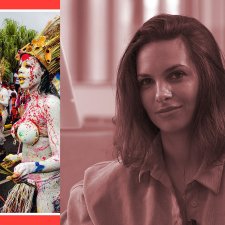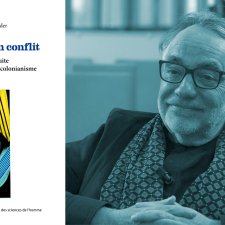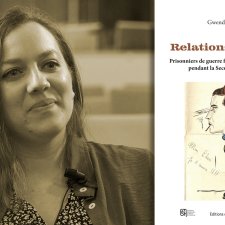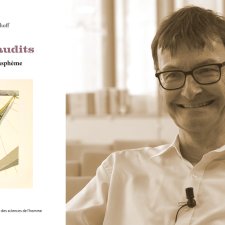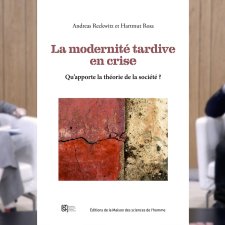Chapitres
- Postmodernité en crise : Causes et conséquences ?03'12"
- Théorie de la société : Outil d'analyse ou levier de solutions face aux crises ?03'14"
- Théorie en dialogue : Recoupements et divergences avec Andreas Reckwitz ?03'31"
- Résilience sociale et changement : Voies vers une transformation durable ?02'52"
Notice
Retranscription
I believe that today, in the early 21st century, we are dealing with a superimposition of at least three crises that are interrelated but not identical. On the one hand, of course, we have the ecological crisis, which can no longer be overlooked and has actually become tangible in all parts of the world. Particularly in climate change, but also in species extinction, for example. We are aware of all these diagnoses that say we may be approaching dangerous tipping points, beyond which it is no longer possible to say how the climate will develop. The second thing is: I believe we have a political crisis or a social crisis in the way people treat each other. And this can also be seen on two levels: one in the democracies themselves and, one in the established democracies. In the USA, President Trump has just been elected for the second time and many people think that this is somehow not the right form of democracy as it was intended. And above all, we are seeing enormous aggression in the way people treat each other, to the point where politicians are being shot at. That also happened in Germany during the last round of elections. And we see a kind of essential dissatisfaction with the existing political system. There are studies on political culture that make it clear that the problem lies in the fact that people no longer see each other as human beings, as citizens with different political views. Instead, they see each other as enemies of humanity on the other side, who even arouse disgust and massive rejection. And that means you can see that there is a crisis in the way social exchange and democracy are handled. And this has its continuation, so to speak, in the area of military conflicts, which have also returned to Europe on a massive scale. You can say that there have always been wars. That's true, even in modern times, even in Europe, if you think of the war in Yugoslavia. And there's no need to mention Afghanistan and Iraq. But the difference really is, as German Chancellor Olaf Scholz put it very clearly, Zeitenwende, that up to and including the war in Yugoslavia, we thought that unfortunately there were still wars. We need to improve the security architecture, that of the UN, that of Europe, in order to overcome this in the future. We have seen wars in the past as remnants of a fatal age. And the concept of a new era says, no, that's what lies ahead of us. We have to become fit for war. That's a huge difference in cultural perception. We are now entering the age of epidemics with Covid, the age of war with Olaf Scholz and the others and the age of ecological catastrophe. And we also have a crisis, what I would call a psychological crisis. This means that burnout rates are extremely high worldwide, with the exception of a few African countries, by the way. But in all other parts of the world, people have the feeling that they can't go on like this, they can't go on, they're running out of energy. And I interpret this as the result of an aggressive relationship with the world. In our entire state of mind, we are in a state of aggression towards the world, towards nature, which we abuse extractively and then poison, so to speak. To other people, who we always encounter as obstacles or enemies. And also towards ourselves. We are never enough for ourselves. We have to change our body, improve our psyche, optimise ourselves. And this relationship of aggression is a consequence of permanent growth and the compulsion to accelerate, an…
Lire l'intégralitéLa modernité tardive en crise. Qu'apporte la théorie de la société ? - Hartmut Rosa
- document 1 document 2 document 3
- niveau 1 niveau 2 niveau 3
Descriptif
Interview de Hartmut Rosa, dans le cadre de la sortie de son ouvrage La modernité tardive en crise. Qu'apporte la théorie de la société ?
Intervention / Responsable scientifique
Thème
Dans la même collection
-
De la rue à la mairie
HamouDavidInterview de David Hamou, dans le cadre de la sortie de son ouvrage "De la rue à la mairie. Sociologie du municipalisme"
-
Voukoum. Esprits rebelles du carnaval guadeloupéen
PavyFloreInterview de Flore Pavy, dans le cadre de la sortie de son ouvrage "Voukoum. Esprits rebelles du carnaval guadeloupéen"
-
Mémoires en conflit. Points de fuite de l'Holocauste et du colonialisme
SznaiderNatanInterview de Natan Sznaider, dans le cadre de la sortie de son ouvrage "Mémoires en conflit. Points de fuite de l'Holocauste et du colonialisme"
-
La Mouridiyya en marche
BabouCheikh Anta Mbacké" La Mouridiyya en marche" est un livre essentiel pour comprendre les interactions entre spiritualité, culture et mondialisation, sur la communauté soufie des Mourides du Sénégal.
-
Relations interdites. Prisonniers de guerre français et femmes allemandes pendant la Seconde Guerre…
CicottiniGwendolineInterview de Gwendoline Cicottini, dans le cadre de la sortie de son ouvrage "Relations interdites"
-
Zygmunt Bauman. Une biographie
WagnerIzabelaInterview de Izabela Wagner, dans le cadre de la sortie de son ouvrage "Zygmunt Bauman Une biographie"...
-
Black Metropolis : Une ville dans la ville. Chicago (1914-1945).
RaulinAnneAtukpeSarahInterview de Anne Raulin et Sarah Atukpe, dans le cadre de la sortie de l'ouvrage "Black Metropolis : une ville dans la ville. Chicago 1914-1945
-
Nymphoplastie. Coupez ce sexe que je ne saurais voir
PiazzaSaraInterview de Sara Piazza, dans le cadre de la sortie de son ouvrage "Nymphoplastie. Coupez ce sexe que je ne saurais voir"
-
Jardins en commun(s) - Politiser l'écologie ordinaire
SachseVictoriaInterview de Victoria Sachsé, dans le cadre de la sortie de son ouvrage "Jardins en commun(s). Politiser l'écologie ordinaire"
-
Dieux maudits - L'histoire du blasphème
SchwerhoffGerdInterview de Gerd Schwerhoff, dans le cadre de la sortie de son ouvrage "Dieux maudits. L'histoire du blasphème"
-
Histoire de la pop. Quand la culture jeune dépasse les frontières (années 1950-1960)
MrozekBodoInterview de Bodo Mrozek, dans le cadre de la sortie de son ouvrage "Histoire de la pop. Quand la culture jeune dépasse les frontières (années 1950-1960)"
-
Qu'est-ce que la Chine ? Territoires, ethnies, cultures et histoire
GeZhaoguangInterview de Zhaoguang Ge, dans le cadre de la sortie de son ouvrage : Qu'est-ce que la Chine ? Territoires, ethnies, cultures et histoire
Avec les mêmes intervenants et intervenantes
-
Présentation de l'ouvrage "La modernité tardive en crise."
RosaHartmutIllouzEvaPrésentation de l'ouvrage "La modernité tardive en crise.", avec Hartmut Rosa, présenté par Eva Illouz
-
ENTENDRE ET RÉPONDRE AU LIEU DE POSSÉDER ET CONTRÔLER
RosaHartmutSéminaire Accumulations et accélérations | Mardi 1er juin Séance du séminaire Accumulations, accélérations, Covid-19 : de l’emballement viral aux alternatives avec Hartmut Rosa, professeur



